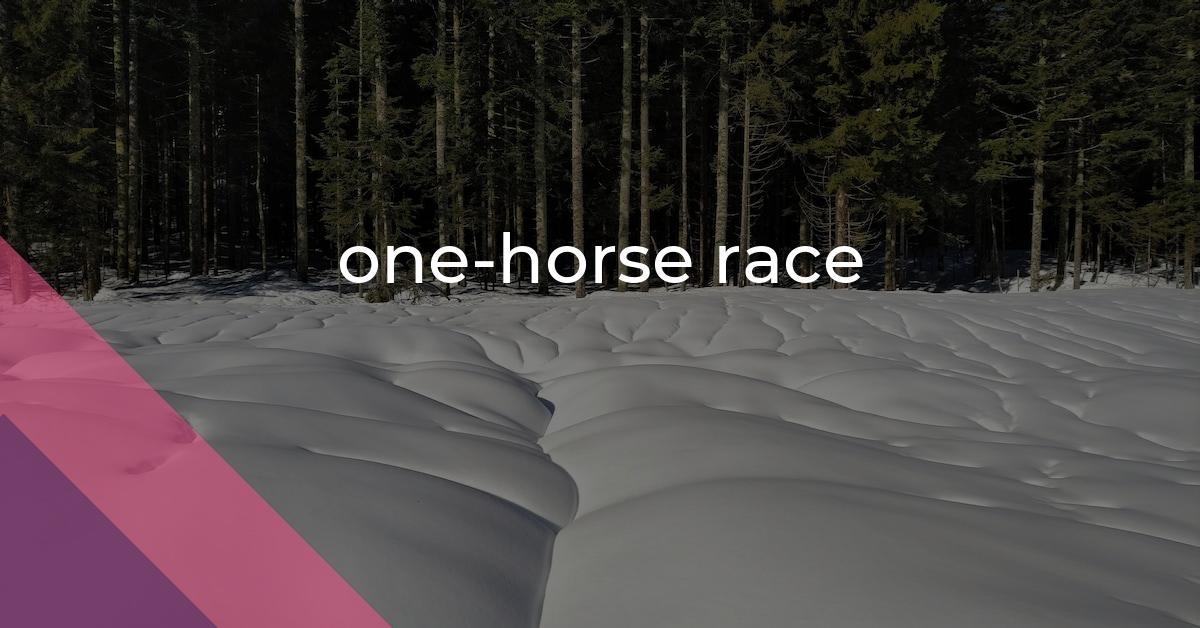one-horse race: Idiom Meaning and Origin
What does ‘one-horse race’ mean?
The idiomatic expression "one-horse race" refers to a competition or contest in which the outcome is completely predetermined, usually due to the overwhelming superiority of one participant.

Idiom Explorer
The idiom "shoo-in" refers to a person or thing that is almost certain to win or be selected due to an overwhelming advantage or lack of competition.
The idiom "runners and riders" refers to the list of participants in a race or competition, particularly in horse racing. It symbolizes the range of options or contenders and is commonly used to discuss the potential outcomes of an event.
The idiom "run for the roses" means to compete in something prestigious or valuable, particularly in a horse race.
The idiom "run for one's money" means to provide a strong competition or challenge, often to someone who is expected to win easily.
The idiom "race out of the traps" means to start quickly or energetically, often used to describe someone's fast or enthusiastic beginning in a competition or endeavor.
The idiom "race against time" means to hurry or work quickly to complete a task or reach a goal before a deadline or before it becomes too late.
The idiom "pull ahead" means to move forward or make progress in a competition or race. It signifies gaining an advantage or surpassing others in the pursuit of a particular goal or objective.
"Play to win" is an idiom that means to engage in a situation or activity with the intention of achieving victory or success, rather than just participating or going through the motions. It emphasizes the importance of being competitive and putting forth one's best effort to achieve a specific goal or outcome.
The idiom "play the race card" refers to the act of using one's race as a means to gain advantage in a situation or to deflect criticism by accusing others of racism.
Unpredictable Outcome
The idiom "one-horse race" refers to a situation or competition where there is only one clear winner, with no real competition or challenge involved. This idiom can be traced back to the early 19th century and is widely used to describe contexts lacking competition or excitement.
One possible origin of this idiom comes from horse racing, a popular sport where horses compete in races to determine the fastest and best horse. In a "one-horse race," there is only one competitor, making it obvious who will win without any question or doubt. This term has been adopted into broader usage to describe any situation where the outcome is predictable due to a lack of significant competition.
A related idiom is "no horse in this race," which means that someone has no personal stakes or interest in a particular competition or situation. This idiom emphasizes the lack of involvement or vested interest in the outcome.
Another possible origin of the idiom is rooted in the horse-and-buggy era when traveling by horse-drawn carriage was common. A "one-horse" carriage was a simple, basic design meant for only one person or a small load, lacking the comfort, style, and speed of larger and more sophisticated carriages. This notion of something being "one-horse" came to represent something inferior, small, or lacking excitement, which eventually led to the development of the idiom "one-horse race" to describe a situation lacking competition or significance.
Nowadays, the idiom "one-horse race" is used in various contexts, from sports to politics to business. For example, in a sports competition, if one team or individual is vastly superior to their opponents and expected to win easily, it can be called a "one-horse race." Similarly, in political elections, if a candidate has no serious competition, their victory can be described as a "one-horse race."
In addition to "no horse in this race," another related idiom is "one-horse town," which refers to a small, unimportant, or boring place. The idiom suggests a lack of excitement, significance, or opportunities in a particular location.
From a cultural perspective, the idiom "one-horse race" reflects a society that values the excitement, unpredictability, and healthy competition inherent in various aspects of life. It highlights the desire for suspense and fairness when it comes to competitions or races, and it acknowledges that there are situations where the outcome is predictable and lacks excitement or interest.
To summarize, the idiom "one-horse race" has its origins in horse racing and the horse-and-buggy era. It describes a situation with only one clear winner and no real competition involved, whether it be in sports, politics, or other contexts. This idiom reflects a society that values competition, suspense, and fairness while acknowledging the existence of predictable outcomes. It captures a sense of certainty and predictability while leaving room for the possibility of more exciting or challenging races or competitions.
Example usage
Examples of how the idiom "one-horse race" can be used in a sentence:
- This election is a one-horse race, as the incumbent candidate has no strong challengers.
- The competition was such a one-horse race, with one team dominating and winning by a large margin.
- Don't bother watching that game, it's a one-horse race and the outcome is already obvious.
More "Sports" idioms



